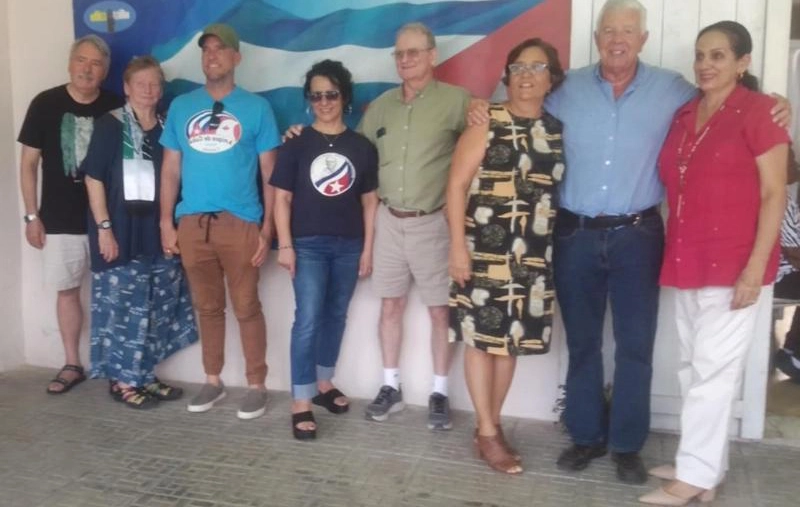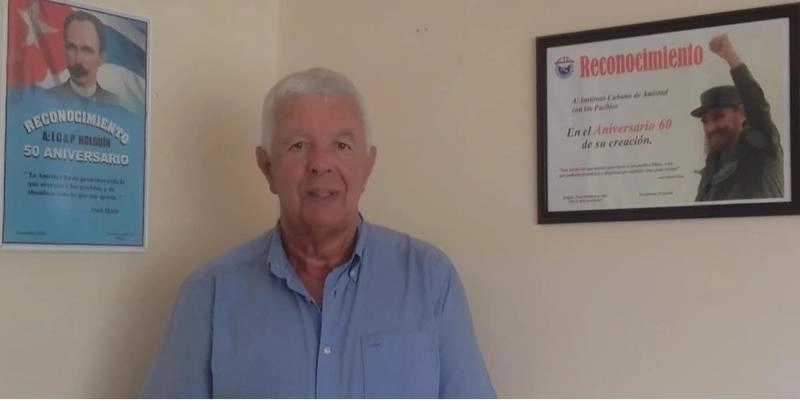The 80th anniversary of the bilateral relations between the Republic of Cuba and Canada, which began on March 16th, 1945 – at the end of World War II, in which both countries participated in the Allied bloc against Nazi fascism – and their subsequent consolidation based on friendship, cooperation, and mutual respect, constitute the essence of the book that professor, researcher, and essayist Dr. John M. Kirk is about to publish.
A Canadian, born in England 74 years ago, with a very particular approach to Cuba, the recognized professor of Latin American studies at Dalhousie University in Halifax, Nova Scotia, and a visiting professor at the University of Havana, has published 16 books about the largest of the Antilles, which he first visited in 1976, along with several members of the Canada-Cuba Friendship Association, invited by Icap.
His passion for this land and its rich history is so great that the doctoral thesis consisted of a study on Martian thought, titled: “José Martí: Mentor of the Cuban Nation,” for which he studied the 27 volumes of the extensive and diverse works of the creator of the Cuban Revolutionary Party and organizer of the Necessary War (1895), but the malicious people from Miami made a big bonfire in the middle of Calle 8, with the books sold in that city.
In any case, the money from the sales of that work was donated to Cuba, and the book was reprinted.
During his first visit to this city of Holguin, along with other members of the Calixto García Brigade, Kirk explained that he has devoted an important part of his time to writing about various topics related to Cuba, such as international relations, examples of solidarity, history, religion, culture and health, including some as a co-author.
In the case of health, he dedicated a lot of time to researching in the field the solidarity of Cuban professionals in different parts of the world, whose studies began in Tarará, where children affected by the accident that occurred on April 26th, 1986 at the Vladimir Ilyich Lenin nuclear power plant, in northern Ukraine, were treated.
Later, with the support of the Cuban authorities, he went to El Salvador, to learn about the work of the Henry Reeve Medical Brigade (medical-health aid to populations of countries victims of natural disasters and epidemics). Meanwhile, in Guatemala, he appreciated the successes of Operation Miracle.
The interviews conducted with nearly 300 collaborators were the essence of his book “Public Health Without Borders”, which honors the doctors, technicians, and nurses who, selflessly, have saved lives in a large number of countries across different parts of the world. This friend from Cuba is proud to have personally met Commander in Chief Fidel Castro Ruz during a visit in 1994, with a trade delegation from Nova Scotia (25 people), serving as an interpreter.
On the first day, when they met him at the Palace of the Revolution, he was introduced by the then Minister of Fishing, who told Commander in Chief Fidel Castro that for many years he had served as a translator for Cuban fishermen in Canada, without any monetary interest. Fidel then joked with him and invited him to come, with his three children, to vacation in Cuba, in recognition of his selfless support. Gratefully, Kirk confessed that he had a wonderful time with his family.
Later he served on other occasions as an interpreter at important meetings of the Cuban leader with Canadian personalities and fondly remembers the day he accompanied him, while working in his office, until three in the morning. He also takes pride in the fact that his daughter is a Martian and recognizes in Fidel an extraordinary man.
Professor John M. Kirk is a man of vast culture and a diligent researcher, whose perfect command of Spanish facilitates communication on various Canadian-Cuban topics, whose relations have been maintained over the last 80 years, even when, following the Revolution’s triumph in 1959, the Caribbean nation became practically isolated due to pressures from the U.S. government; only Canada and Mexico maintained relations without fearing the consequences.
In the dialogue held with him at the provincial delegation of Icap, we recalled how both countries have strengthened relations, constituting the main market for the tourism industry. Along with significant investments in the mining and energy sectors, Export Development Canada (EDC) and the Canadian Commercial Corporation (CCC) support trade, while private companies and financial institutions such as the National Bank of Canada maintain an exemplary relationship with Cuba.
There are also notable joint projects in areas such as science and technology, renewable energy, women’s empowerment, cultural and sports exchanges, as well as humanitarian assistance in disaster situations, such as that provided in 2024 to populations affected in Cuba by hurricanes Rafael and Oscar.
This journalist could not overlook, in the dialogue, the original and attractive spectacle of the tricolor reflection at Niagara Falls, simulating the Cuban Flag, while the notes of the National Anthem (of Bayamo) were sung by members of the solidarity movement with Cuba, such as the Juan Gualberto Gómez Association and the collective from the Consulate General of Cuba in Toronto. A happy initiative, in tribute to José Martí and the relations between both countries.
Some background on Canada-Cuba relations. Historians of both countries locate the first encounters from their respective colonial times, such as the arrival in Havana in 1601 of Samuel de Champlain, an important French explorer and colonist, whose greatest achievement was founding New France, where he established relations with various indigenous peoples and laid the foundations of the city of Quebec (1608) in present-day Canada.
A year later, Pierre Le Moyne, another significant figure in Franco-Canadian history, arrived in Havana, and from the construction of the port of Halifax (1740), important trade exchanges originated between the province of Nova Scotia and Cuba. In 1899, the first foreign bank (Royal Bank of Canada) was established in Cuba, followed by the Bank of Nova Scotia.
With the establishment in 1902 of the Republic of Cuba (mediated), the first contacts were maintained with the federal domain of Canada, where, a year later, in Yarmouth, a small…town In the port city of Nova Scotia, the first of the seven consulates of the island abroad was established, and in 1909 Cuba hosted one of the first Canadian trade offices in Latin America.
Cuba appreciates the historical relations and friendship of Canada, whose solidarity groups call for the end of the U.S. blockade and for the country to be removed from the spurious list of those who supposedly sponsor terrorism. I take the opportunity to join those calling for the closure of the naval base that the United States government maintains in Cuban territory in Guantanamo.
Many Canadians are pleased to come to Cuba and encounter the reality that those who do not forgive the sustained independence, despite the adversities, try to vilify, and as for relationships, it is impossible to forget the visits of three Canadian prime ministers to Cuba (Pierre Trudeau in 1976, Jean Chrétien in 1998, and Justin Trudeau in 2016).
He visited the northern country in April 1959 and in the year 2000 he attended the funeral of Pierre Trudeau, with whom he maintained good relations of friendship. Time goes by, but he is rewarded by the memory of those who like to know how much is written about him, for José Martí wrote that: “it is necessary to rise to the height of the times, and to count on them.” Hence, the gratitude to Dr. John M. Kirk for his bibliographic contributions and the love he feels for Cuba, even in times of difficulties.
Translated by Aliani Rojas Fernández
- Holguin Students Show Solidarity with Venezuela - 16 de January de 2026
- Lupe: Leadership and Dedication from ICAP in Holguin - 13 de January de 2026
- ICAP Celebrates 65 Years of Solidarity Actions in Holguin - 1 de January de 2026

